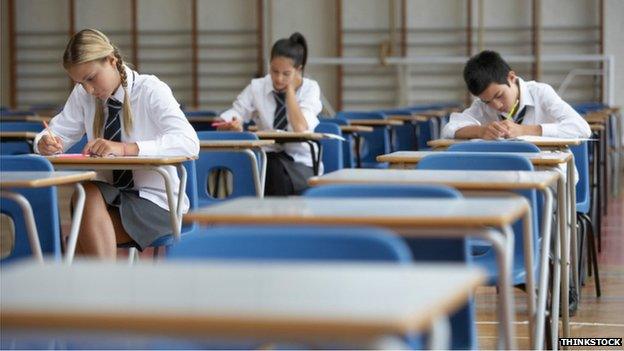SQA defends high failure rate in new National 5 exam
- Published

The qualifications agency has defended one of the new exams after an unusually large number of candidates failed.
Four out of 10 candidates failed the National 5 exam in media studies even though the pass mark was lowered to just 43%.
The SQA says it had "robust mechanisms" in place to ensure candidates were challenged at the right level.
The new National 4 and 5 qualifications were introduced this year to replace Standard Grades.
One parent at a Glasgow school claimed she knew of several examples this year of youngsters getting a far worse grade in media studies than they had expected.
She said some who had expected an A grade had got a C, failed or were given no award.
"This if very frustrating as some pupils who want to sit Higher media are not being allowed to continue as they don't have the relevant grade," she said.
"Pupils and parents do not have any direct means of appealing and by the time that the schools do this it is too late for the pupils to pick up the subject at the higher level."
Pass rates
Overall, 60% of the people who sat the National 5 in media studies passed.
Pass rates varied from subject to subject but the overall pass rate for National 5s was 81%.
Meanwhile, a mark of just 43% was needed to pass media studies - an unusually low figure.
One possible explanation may be that the paper was harder than many candidates and teachers had anticipated. Another is simply that too few of the candidates reached the required standard.
The SQA produced a sample exam paper - as it did with other subjects - and highlighted questions in previous exam papers which remained relevant.
In a statement, the SQA said: "SQA takes its responsibility to uphold the high standards of Scottish qualifications very seriously.
"It has a very robust set of mechanisms in place to ensure that qualifications offer an appropriate level of challenge for candidates and that every year's cohort is presented with a similar degree of challenge."
'Well received'
The authority said the new course had been well received by both education and industry commentators.
It added that the exam paper was similar in standard to the specimen paper it had previously published and that events and materials had been available to teachers and lecturers to strengthen their understanding of the standards expected of students.
It is rarely the case that the pass mark in a subject is exactly 50%. The marks needed for particular grades are also often revised up or down slightly once the exam papers have been marked.
The mechanism is designed to act as a quality assurance and a safeguard against any claims that exams are being made easier or harder.
In general, if fewer candidates than expected do well, this may suggest the paper was slightly too hard so the pass mark is lowered slightly. If too many do well, it might suggest the paper was too easy so the mark is raised.
For example, in biology the pass mark was lowered to 47 out of 100, while in English it was raised, so that 52 marks out of 100 were needed for a C.
Teachers unions had concerns about the implementation of the new qualifications, arguing staff and students were facing additional workload, bureaucracy and even stress.
However the administration of the exams and the marking and delivery of the results passed off without incident.
- Published5 August 2014

- Published25 July 2014
